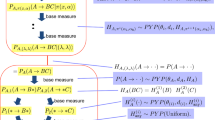Abstract
Property Grammars, or PGs, belong to a new family of linguistic formalisms which view a grammar as a set of linguistic constraints, and parsing as a constraint satisfaction problem. Rigid hierarchical parsing gives way to flexible mechanisms which can handle incomplete, ambiguous or erroneous text, and are thus more adequate for new applications such as speech recognition, internet mining, controlled languages and biomedical information. The present work contributes a) a new parsing methodology for PGs in terms of Hyprolog – an extension of Prolog with linear and intuitionistic logic and with abduction; and b) a customisable extension of PGs that lets us model also concepts and relations to some degree. We exemplify within the domain of extracting concepts from biomedical text.
An earlier version of this paper has been presented “On Semantically Constrained Property Grammars”, Proceedings of the 5th International Workshop on Constraints and Language Processing (CSLP 2008), Villadsen, J., Christiansen, H., (Eds), ROSKILDE UNIVERSITY COMPUTER SCIENCE RESEARCH REPORT #122, 2008, pp. 20–32.
Preview
Unable to display preview. Download preview PDF.
Similar content being viewed by others
References
Abney, S.: Parsing By Chunks. In: Berwick, R., Abney, S., Tenny, C. (eds.) Principle-Based Parsing. Kluwer Academic Publishers, Dordrecht (1991)
Blache, P.: Property Grammars: A Fully Constraint-Based Theory”, in H. Christiansen et al. (eds), Constraint Solving and NLP, LNCS, Springer, 2005.
Chomsky, N.: The Minimalist Program. MIT Press, Cambridge (1995)
Christiansen, H., Dahl, V.: HYPROLOG: A New Logic Programming Language with Assumptions and Abduction. In: Gabbrielli, M., Gupta, G. (eds.) ICLP 2005. LNCS, vol. 3668, pp. 159–173. Springer, Heidelberg (2005)
Dahl, V., Blache, P.: Directly Executable Constraint Based Grammars. In: Proc. of Journees Francophones de Programmation en Logique avec Contraintes (2004)
Dahl, V., Blache, P.: Extracting Selected Phrases through Constraint Satisfaction. In: Proceeding of ICLP workshop on CSLP (2005)
Dahl, V., Tarau, P.: Assumptive Logic Programming. In: Proc. ASAI 2004, Cordoba, Argentina (2004)
Dahl, V., Tarau, P., Li, R.: Assumption Grammars for Natural Language Processing. In: Naish, L. (ed.) Proc. Fourteenth International Conference on Logic Programming, pp. 256–270. MIT Press, Cambridge (1997)
Dahl, V., Gu, B.: A CHRG Analysis of ambiguity in Biological Texts. In: Proceedings of the 4th International Workshop on Constraints and Language Processing (CSLP), Denmark (2007)
Frühwirth, T.: Theory and Practice of Constraint Handling Rules. Journal of Logic Programming 37, 1–3 (1998)
Girard, J.-Y.: Linear Logic. Theoretical Computer Science 50, 1–102 (1987)
Kakas, A.C., Kowalski, R.A., Toni, F.: The role of abduction in logic programming. In: Handbook of Logic in Artificial Intelligence and Logic Programming, vol. 5, pp. 235–324 (1998)
Mel’čuk, I.: Dependency Syntax. SUNY Press (1988)
Morawietz, F.: Chart parsing as contraint propagation. In: Proceedings of COLING 2000 (2000)
Osborne, M.: MDL-based DCG Induction for NP Identification. In: Proceedings of CoNLL 1999 (1999)
Pollard, C., Sag, I.: Head-driven Phrase Structure Grammars. CSLI, Chicago University Press (1994)
Prince, A., Smolensky, P.: Optimality Theory: Constraint Interaction in Generative Grammars, Technical Report RUCCS TR-2, Rutgers Center for Cognitive Science (1993)
Sag, I., Wasow, T.: Syntactic Theory. A Formal Introduction. CSLI (1999)
Shieber, S., Schabes, Y., Pereira, F.: Principles and implementation of deductive parsing. Journal of Logic Programming 24(1-2), 3–36 (1995)
Tesnière, L.: Éléments de syntaxe structurale, Klincksieck (1959)
Author information
Authors and Affiliations
Editor information
Editors and Affiliations
Rights and permissions
Copyright information
© 2009 Springer-Verlag Berlin Heidelberg
About this paper
Cite this paper
Dahl, V., Gu, B., Maharshak, E. (2009). A Hyprolog Parsing Methodology for Property Grammars. In: Cabestany, J., Sandoval, F., Prieto, A., Corchado, J.M. (eds) Bio-Inspired Systems: Computational and Ambient Intelligence. IWANN 2009. Lecture Notes in Computer Science, vol 5517. Springer, Berlin, Heidelberg. https://doi.org/10.1007/978-3-642-02478-8_60
Download citation
DOI: https://doi.org/10.1007/978-3-642-02478-8_60
Publisher Name: Springer, Berlin, Heidelberg
Print ISBN: 978-3-642-02477-1
Online ISBN: 978-3-642-02478-8
eBook Packages: Computer ScienceComputer Science (R0)




